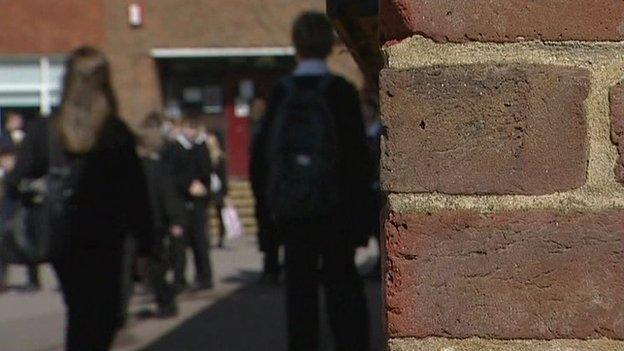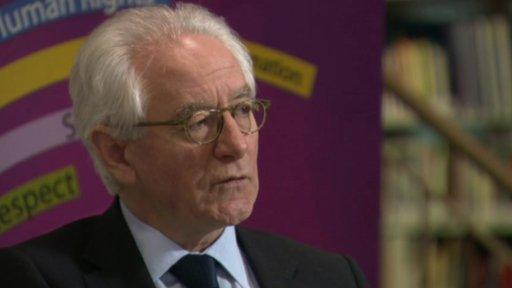Academic selection 'reinforces privilege and disadvantage' says report
- Published
The report recommends the end of the current system of academic selection
A report into the effects of deprivation on educational achievement has recommended the end of the current system of academic selection in Northern Ireland.
It claims it reinforces "privilege and disadvantage".
The report - Investigating Links in Achievement and Deprivation (Iliad) - was commissioned by the Office of the First and Deputy First Minister.
It has been delivered, but not yet published.
However, a draft copy has been seen by the BBC.
The study looked at why pupils in some areas of high deprivation outperform their peers in other deprived areas.
The three-year study was conducted by 10 experts from Queen's University and Stranmillis University College in Belfast.
'Socio-economic status'
Among its recommendations is "the ending of the current system of academic selection" as a key way to reverse educational disadvantage.
The report also said the current system is "high on excellence and low on equity" and that "access to the best education is too often determined by socio-economic status".
"The current system significantly favours those with positive family norms around education, for example, academically successful parents, and the financial capacity to afford, for example, private tutors," the report said.
However, it also warns: "Given the in-built and distinct advantage of a grammar school education and the significant political and lobbying influence of the grammar sector, opposition to radical change is expected."
The Iliad study began in 2012 and is one of the most detailed of its kind ever carried out in the UK.
It examines why children in highly deprived "Catholic" areas often substantially outperform their counterparts in highly deprived "Protestant" areas.
Factors
It studied seven deprived areas in depth: three predominantly Catholic, three predominantly Protestant and one mixed area.
It suggests that in "Catholic" wards, there are a number of factors which help children do better in education. These include:
Stronger relationships and engagement between schools and the local community.
Stronger links between schools and the families of pupils, leading to more parental support for education.
Better collaboration between schools.
Principals and teachers from, or who live in, the community around the school, enabling them to better understand their pupils needs.
Lower levels of absenteeism among pupils.
"In several predominantly Catholic neighbourhoods, there are well-established, collaborative learning communities," the report said, "with Catholic maintained schools at the hub".
These factors meant that children in "Catholic" wards generally placed more value on education, had higher aspirations and self-esteem - and achieved better results - than their "Protestant" counterparts.
For instance, the "Catholic" Whiterock ward in west Belfast is the most deprived area in Northern Ireland, yet in 2012/13, 60% of pupils there achieved five GCSE passes at grades A*-C.
By contrast, the predominantly "Protestant" Tullycarnet ward in east Belfast is the 109th most deprived, yet only 43% of pupils achieved five GCSEs at grades A*-C in the same year.
The report also found a "Derry effect" whereby pupils in deprived "Catholic" wards in Londonderry were encouraged to value education highly, leading to better results.
The Rosemount ward in the city is the 44th most deprived in Northern Ireland, yet 91% of pupils there got five GCSEs at A*-C in 2012/13.
The report found that while there have been some rises, gaps in achievement between the wards have changed little in almost two decades.
'Corrosive impact'
The report also highlights "dissatisfaction with political leadership" as most pronounced in the "Protestant" wards.
It also warns of the "corrosive impact" of continuing paramilitary and criminal influence in disadvantaged communities, saying this creates "negative role models and many young people routinely witness individuals 'succeeding' outside the regular channels of education".
The report also includes a wide range of suggested reforms of the education system in Northern Ireland to attempt to reverse disadvantage.
The report was sent to OFMDFM earlier this year, but as yet, they are unable to say when the final version will be published.
Former Progressive Unionist Party MLA, Dawn Purvis, who was involved in a previous report on underachievement among disadvantaged Protestant boys, said people had to look "at the structural difference within the Protestant community and the tendency towards elitism within the grammar sector".
"We have to abolish academic selection, it doesn't work for Protestant working class children," she added.
However, DUP MLA, Peter Weir, who is chair of the Education Committee at Stormont said he did not believe there was a direct link between academic selection and underachievement among certain Protestant sectors.
"If you abolish academic selection what you will do is you will reinforce the power of money within education and you will widen those divisions," he said.
- Published18 June 2015

- Published15 November 2013

- Published3 April 2014

- Published3 April 2014
